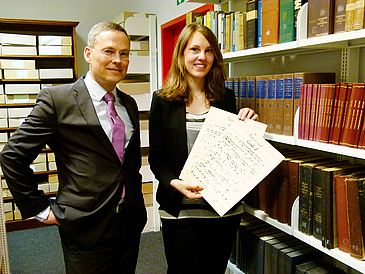When it was unearthed a year ago the find caused something of a sensation. Now finally the Bremen version of Johannes Brahms' Triumphlied is due to be premiered: On Sunday 6th July 2014 at 8.00 pm the Schleswig-Holstein Music Festival will open with Brahms' Bremer Triumphlied performed by the NDR Symphony Orchestra, the NDR Choir and the Rundfunkchor Berlin, conducted by Thomas Hengelbrock. The venue is the Music and Congress Hall in Lübeck, from where at 8.15 pm the concert will be broadcast live on radio for NDR Kultur and for NDR television on the 3Sat channel. The live performance will also be broadcast by the European Broadcasting Union (EBU) to audiences in Belgium, Catalonia, the Czech Republic, Latvia, Rumania, Denmark and listeners to Bayerische Rundfunk.
Original musical composition
The musical score written by Johannes Brahms for the premier performance of the Triumphlied op. 55 in 1871 had long been believed lost. It was unearthed by musicologists Professor Ulrich Tadday and doctoral candidate Katrin Bock from the University of Bremen in the archives of the Bremen Philharmonic Society. By comparing the parts for choir and orchestra in the original music sheets with later versions of the composition they were able to completely reconstruct the musical score written for the original premiere in 1871. According to Professor Tadday “the composition we discovered differs from previously known versions to such an extent that it is deemed to constitute a separate work in its own right and is now known as the 'Bremer' Triumphlied”.
Researchers have identified in excess of 300 deviations and numerous major as well as minor amendments to the composition in contrast to later versions, and the Bremer Triumphlied is in D-major, not C-major. It includes fewer wind instruments, and the large chorus parts are far more fluid in their rhythm and articulation. “All in all, the re-discovered musical score is far more delicate, not quite so dramatic, and less martial in its composition”, says Professor Tadday.
Historical background
Brahms was inspired to write the composition for double choir and large orchestra by his friend, the Bremen musical director Karl Martin Reinthaler. At the time, Brahms wrote to Reithaler describing the piece as his “political observations of the year” the German Empire was created. News of victory in the Franco-Prussian war had reached Brahms in Vienna just a few days before the choir notes were sent to Bremen. The two planned the Good Friday premiere concert in honor of the war dead, and it was Brahms himself who conducted the orchestral musicians and 200 choir singers in the Bremer Dom on 7th April 1871.
If you would like to obtain more information on this topic, please contact:
University of Bremen
Faculty of Cultural Studies
Institute for Musicology and Music Education
Prof.Dr. Ulrich Tadday
Phone. +49 421 218 67760
email: taddayprotect me ?!uni-bremenprotect me ?!.de
Katrin Bock
Phone. +49 421 218 67762
email: kbockprotect me ?!uni-bremenprotect me ?!.de
www.brahms.uni-bremen.de

